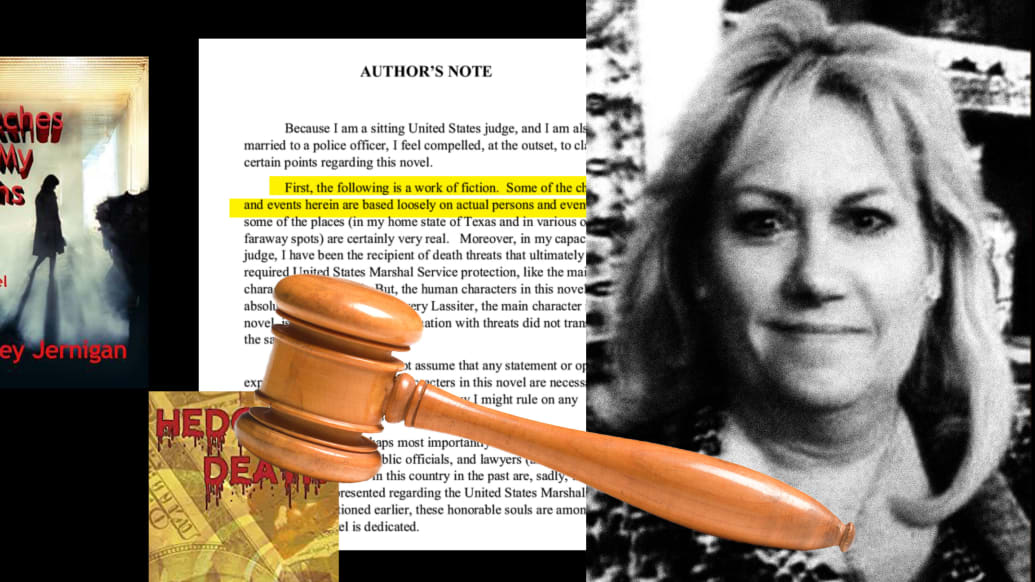Judge Avery Lassiter isn’t real, but she may as well be.
The 42-year-old, travel-loving fictional mother of two and federal bankruptcy court judge bears a striking resemblance to a real-life bankruptcy judge in Dallas—who just so happens to have created her.
Chief Judge Stacey Jernigan, who has two children, a travel blog, and two King Charles Spaniels—the same dogs Lassiter owns—has written two novels starring the fictional judge as her main character. But according to at least one defendant in her bankruptcy court, Lassiter isn’t the only character inspired by real life.
And he isn’t flattered by the comparison.
James Dondero, a litigious hedge fund manager involved in bankruptcy proceedings in Jernigan’s court, believes he is the inspiration for one of the villains in Jernigan’s second novel, Hedging Death. He has now filed four motions to boot her from the case, arguing that she is too biased to oversee the proceedings fairly. (The first novel, which does not mention Dondero’s alleged literary Doppelganger, still describes “high-flying hedge fund managers” as people who “suck up money like an i-robot vacuum,” and show “outrageous amounts of hubris.”)
But Jernigan has refused to step down from the case, setting up a legal battle over just how much art is allowed to imitate life—at least inside a courtroom.
“If [judges are] fictionalizing their cases, then I think maybe there’s a deeper issue,” Kenneth David, a law and ethics professor at Fordham University Gabelli School of Business, told The Daily Beast. “And the issue is that they’re looking to their cases as a source of financial gain.”
“Would that influence the way that they deal with their case?”
If Jernigan had to find a financial tycoon with a litigious past on which to base one of her second novel’s antagonists, James Dondero certainly fits the bill.
The 6-foot-4 New Jersey native worked at J.P. Morgan and American Express before co-founding a credit-focused investment company, Highland Capital Management LP, in 1993. The company started promisingly, at one point reportedly managing about $39 billion, making it one of the biggest credit giants in Dallas. But the 2008 financial crisis led to years of lawsuits and a charge from the Federal Trade Commission, for which he was forced to pay $250,000.
Things only got worse in 2016, when investors in one of Highland’s hedge funds accused the company of financial misconduct. The case ultimately went to arbitration, and a panel awarded the Highland Crusader investors a $189 million judgment and found that Dondero was “actively involved in the misconduct.”
The lawsuit was one of several Dondero faced over the past decade, including one in which a former employee described him as a “megalomaniac” and a headline-grabbing, contentious divorce with the mother of his two daughters.
Photo Illustration by Luis G. Rendon/The Daily Beast/Getty/Twitter
In October 2019, seemingly out of nowhere, Highland Capital Management filed for Chapter 11 bankruptcy in Delaware, saying the company may not have had enough liquid assets to cover the ongoing litigation.
The petition was ultimately transferred to Texas, which is where Dondero and Jernigan first crossed paths.
A Texas native, Jernigan earned her law degree from the University of Texas and served 17 years in the bankruptcy practice group of an international law firm in Dallas before becoming a federal bankruptcy judge in 2006. Along the way, she married a police officer, gave birth to two children, and adopted her dogs Jake and Finley.
Jernigan blogs regularly about her extensive travels, which last year included Austria, the Czech Republic, Spain, Tanzania, and Costa Rica. She drops frequent literary references, such as an allusion to The Sun Also Rises in a blog about a bullfight in Spain, which resurface occasionally in her legal texts. Her persona online is one part lawyer, two parts wine mom. (“Love my King Charles Cavalier Spaniels, wine and TX Longhorns,” her Twitter bio reads.)
In 2019, Jernigan funneled her literary ambitions into He Watches All My Paths, a self-published novel about a “female federal judge from Texas” whose life is “turned upside down by cryptic and terrifying letters” from an “apparently unhappy litigant.” In addition to the similarities between their work, hobbies, families, and pets, Jernigan and her main character, Lassiter, both worked exactly 17 years at an international law firm before becoming judges. In an author’s note, Jernigan reveals that the plotline—which involves Lassiter needing round-the-clock protection by U.S. Marshals—was also inspired by her own experience.
The book has 15 reviews on Amazon—all of them positive—and a writeup on a website called Reader’s Favorite, which called it an “electrifying and poignant tale of justice and society.”
The sequel, Hedging Death, which Jernigan published last year, follows Lassiter as she investigates the disappearance of a wealthy Texas hedge fund manager named Cade Graham, who is described as a “hedonistic, narcissistic playboy” with “sparkling green eyes,” “glowing white teeth,” and a penchant for younger women.
When the reader first meets him, Graham is suspected of faking his own death in a fiery car crash in Mexico in order to weasel out of his various legal troubles.
“There was a lot of strange activity in some of his hedge funds—a lot of money disappearing,” the Lassiter character tells her daughter in the first chapter. “People were suing him. And the Feds were investigating him for all sorts of things.”
“His world was crumbling around him,” she writes ominously. “All kinds of problems were mounting up.”
According to filings in the bankruptcy case, Dondero immediately recognized himself in the arrogant but attractive Graham character. His legal team was livid.

Photo Illustration by Luis G. Rendon/The Daily Beast/Getty/Facebook
The similarities, his lawyers claimed in multiple motions, are undeniable: Graham works at a “multi-billion-dollar conglomerate” in Dallas that manages the same “unusual mix of investments” managed by Dondero’s fund,according to his motion to recuse. The fund in Jernigan’s novel is called Ranger Capital; Highland Capital was previously called Ranger Asset Management. Jernigan has described both Graham and Dondero as reckless investment managers and “nasty” litigants; she characterized both Highland Capital and Ranger Capital’s international tax structures and off-shore transactions as “byzantine.”
In an author’s note at the beginning of He Watches All My Paths, Jernigan writes that the book is a work of fiction, but she admits that some of the characters and events are “based loosely on actual persons and events.” That, combined with Jernigan’s derisive descriptions of hedge fund managers in general, were enough to send Dondero’s legal team over the edge.
“Any reasonable person reading Judge Jernigan’s novel Hedging Death would logically conclude: (1) the novel appears patterned, at least in part, after HCMLP and Mr. Dondero; and (2) the Judge holds bias and prejudice, at the very least highly negative opinions, about hedge-fund managers and private equity industry, generally,” they wrote in a motion to recuse.
In an email to The Daily Beast, Jernigan declined to comment on the pending litigation but stated that “Hedging Death is not about any pending case or litigants in my court.”
“In fact, it is not about a hedge fund in bankruptcy,” she added. “It is about a biomedical research company in bankruptcy with a young Chechen scientist as the owner. It is about an underground BSL-4 medical facility in Texas. It is about a deadly virus from melting permafrost that the biomedical company is attempting to eradicate. It is about a fugitive on the run in Mexico who becomes involved with this facility and with a hedge fund manager character named Cade Graham.”
“Graham is not based on any character in my cases,” she concluded. “At most, he is an amalgamation of the dozens of hedge fund managers that I have seen or read about in my 34-year career in the law.”
Over the course of nearly two years, Dondero and other parties in the bankruptcy case have filed four motions to recuse Jernigan. The judge has hit back, holding Dondero in contempt of court twice—in one instance fining him $450,000 for interfering with Highland Capital’s operations after his ouster.
All the while, Jernignan has promoted her novels in person and on social media, even sending a copy of Hedging Death to prominent thriller writer John Grisham. (He sent her back a copy of his novel, The Judge’s List.)
Her literary promotions occasionally overlap with her legal professional circles, like a book club she hosted for Hedging Death at the International Women’s Insolvency and Restructuring Confederation in 2022. A fellow bankruptcy court judge even reviewed the book for the American Bankruptcy Institute Journal, deeming it “a dandy.” (“The book truly has something for every insolvency professional!” he gushed.)
With each denial—and every tweet—the ethical line between artistic license and judicial impropriety became blurrier.
Kenneth David, a law and ethics professor at Fordham University, said it is not uncommon for federal judges to write books, but that basing novels on cases could be cause for concern. If a judge is making money off something inspired by her cases, he said, it could raise questions about impartiality.
He added that Jernigan’s frequent mentions of her current job in her promotional copy was worrisome. “My feeling is that [judges] shouldn’t use their positions to promote their financial interests.” (In her email, Jernigan said she had obtained “ethical guidance and clearances regarding my fiction writing and regarding the very limited marketing I have done of my books.”)
But David also questioned whether the novels alone were ground enough for recusal.
“Do I think that judges should base novels or fiction writing on cases that they’ve had?” he asked. “I think the answer is no, they absolutely should not.”
“I think the question here is, is that what she did?” he added. “And she thinks she didn’t.”
In March, Jernigan issued her first written ruling on the situation.
The 36-page opinion denies any animus or bias toward Dondero and other parties in the case. While she admits to calling Dondero “litigious” and “vexatious,” she insists that the characterization is based on evidence presented to her throughout their lengthy and complex case. “Not only was there significant credible evidence of [his litigiousness], but it is simply about rule enforcement and managing a docket consistent with this court’s duty to the public,” she wrote.
It takes about 32 pages of Jernigan’s denial for her to comment on her literary side hustle.
While the judge previously intended to remain silent about her writing, the allegations that her novels contain “derisive commentary” about the financial industry or its executives prompted her to speak out, she wrote.
“The Presiding Judge’s novels—again entirely fiction—are not about Mr. Dondero or the hedge fund industry in general,” she wrote, adding that she had no idea that Dondero’s company previously used the name “Ranger.” She noted that many “sitting judges write books—albeit it is more common for them to write legal nonfiction books than fiction books.”
To support her argument, Jernigan called on a few of her literary heroes. Oscar Wilde, she noted, once wrote that “life imitates art far more than art imitates life.” But even the best writers sometimes use inspiration from real life: Agatha Christie used the Lindbergh kidnapping as inspiration for Murder on the Orient Express, she wrote, and “practically everything Ernest Hemingway ever wrote was a highly fictionalized story from his past.”
She added: “The Presiding Judge is somewhat embarrassed to discuss these literary greats in the same paragraph in which she is mentioning her own fiction works—it is merely to make a point.”
While Lassiter and her police officer husband may resemble Jernigan and her spouse, and certain judges, lawyers, and U.S. Marshal characters may seem familiar, she concludes in the motion, “there are no characters or entities in her books that have been inspired by or modeled after the Movants.”
And with that, she denied the motion to recuse herself from the case.
Despite Jerigan’s harsh denial, Dondero and his legal team are not giving up to get her removed.
On April 4, Dondero’s team filed a petition for mandamus to remove Jernigan in Texas District Court. But the federal court ordered that his petition be unfiled a day later on technical grounds.
That same day, Dondero and four other companies filed the second writ of mandamus in a separate civil docket. The second writ of mandamus also included a five-part appendix—which made the amended filing a total of 3625 pages.
Since April 11, when a certificate of interest and disclosure of statement was filed on behalf of Dondero and the four companies, the latest against Jernigan remained stagnant. Dondero’s lawyer, however, has insisted his team is not backing down.
“As stated in the Petition for Writ of Mandamus, impartiality and judicial ethics are core to ensuring a fair legal process, and we believe the Circuit Court must act to adjudicate this matter, instead of relying on the judge at issue,” attorney Michael Lang of Crawford said.
Only time will tell if Dondero is luckier than his alleged fictional counterpart. By the end of Hedging Death, Cade Graham is apprehended after failing a daring helicopter escape inside a Mexican villa.






